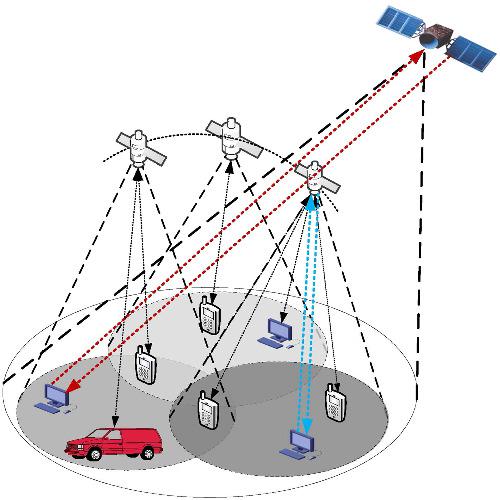当前位置:
X-MOL 学术
›
Int. J. Satell. Commun. Netw.
›
论文详情
Our official English website, www.x-mol.net, welcomes your
feedback! (Note: you will need to create a separate account there.)
Cooperative user association and resource allocation for task offloading in hybrid GEO-LEO satellite networks
International Journal of Satellite Communications and Networking ( IF 0.9 ) Pub Date : 2021-11-02 , DOI: 10.1002/sat.1436 Tao Leng 1, 2 , Pengfei Duan 1, 2 , Dongwei Hu 3 , Gaofeng Cui 1, 2, 3 , Weidong Wang 1, 2
International Journal of Satellite Communications and Networking ( IF 0.9 ) Pub Date : 2021-11-02 , DOI: 10.1002/sat.1436 Tao Leng 1, 2 , Pengfei Duan 1, 2 , Dongwei Hu 3 , Gaofeng Cui 1, 2, 3 , Weidong Wang 1, 2
Affiliation

|
Hybrid geosynchronous earth orbit (GEO) and low earth orbit (LEO) satellite networks play an important role in future satellite-assisted internet of things (S-IoT). However, the limited satellite on-board communication and computing resource poses a large challenge for the task offloading in the hybrid GEO-LEO satellite networks. In this paper, the problem of task offloading is formulated as a cooperative user association and resource allocation problem. To tackle the problem, we model it as a Markov decision process and decompose it into two sub-problems, which are sequential decisions for user association and resource allocation with fixed user association conditions. Deep reinforcement learning (DRL) is adopted to make sequential decisions to achieve long-term benefits, and convex optimization method is utilized to obtain optimal communication and computing resource allocation. Simulation results show that the proposed method is superior to other referred schemes.
中文翻译:

混合 GEO-LEO 卫星网络中任务卸载的协作用户关联和资源分配
混合地球同步地球轨道 (GEO) 和低地球轨道 (LEO) 卫星网络在未来的卫星辅助物联网 (S-IoT) 中发挥着重要作用。然而,有限的星载通信和计算资源对混合GEO-LEO卫星网络中的任务卸载提出了巨大挑战。在本文中,任务卸载问题被表述为一个协作的用户关联和资源分配问题。为了解决这个问题,我们将其建模为马尔可夫决策过程,并将其分解为两个子问题,即用户关联的顺序决策和具有固定用户关联条件的资源分配。采用深度强化学习 (DRL) 做出顺序决策以实现长期利益,并利用凸优化方法获得最优的通信和计算资源分配。仿真结果表明,该方法优于其他参考方案。
更新日期:2021-11-02
中文翻译:

混合 GEO-LEO 卫星网络中任务卸载的协作用户关联和资源分配
混合地球同步地球轨道 (GEO) 和低地球轨道 (LEO) 卫星网络在未来的卫星辅助物联网 (S-IoT) 中发挥着重要作用。然而,有限的星载通信和计算资源对混合GEO-LEO卫星网络中的任务卸载提出了巨大挑战。在本文中,任务卸载问题被表述为一个协作的用户关联和资源分配问题。为了解决这个问题,我们将其建模为马尔可夫决策过程,并将其分解为两个子问题,即用户关联的顺序决策和具有固定用户关联条件的资源分配。采用深度强化学习 (DRL) 做出顺序决策以实现长期利益,并利用凸优化方法获得最优的通信和计算资源分配。仿真结果表明,该方法优于其他参考方案。











































 京公网安备 11010802027423号
京公网安备 11010802027423号